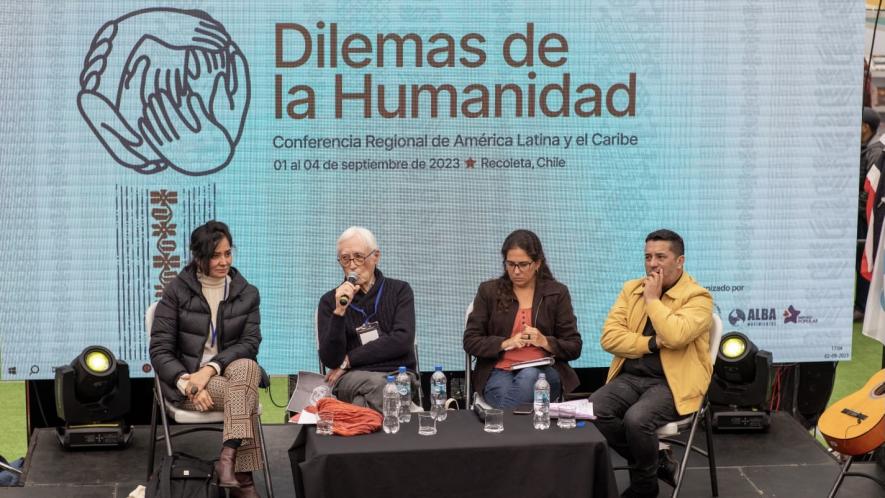We Must Have Contact With That Gigantic Precariat -- Today’s Proletariat: Héctor Béjar

Héctor Béjar speaking at the opening panel of the Dilemmas of Humanity Regional Conference in Santiago, Chile. Photo: Fotos en lucha
Lee en español aquí
If you look at the political map of Latin America and the Caribbean today, the majority of the region is ruled by progressive or left leaning governments. This marks a significant shift from five years ago when US-aligned conservatives dominated the map.
However, the battle is far from won. Imperialist interests continue to threaten the region and local oligarchies continue attempts to undermine and overthrow these governments. Added to this is a perhaps new factor, which is the growing support for the far-right wing among working-class sectors.
This phenomenon raises fundamental questions for people on the left.
Why are large sectors of the working class supporting candidates and policies that are directly against their interests? Why are left and progressive organizations and governments unable to channel their sentiments of discontent and frustration with the political system and with capitalism? How can the left dialogue with these pivotal sectors and build with them?
In the opening panel of the Dilemmas of Humanity Regional Conference held in Santiago de Chile from September 2-4, 2023, lifelong Peruvian revolutionary and writer Héctor Béjar addressed some of these key questions, emphasizing the pending tasks for left forces if they are serious about bringing about structural change for the good of all humanity.
There is a dark secret world underneath the reactionary political system in Latin America. A world of monsters that are ready to come to the surface, at the slightest opportunity. And one of our tasks is to uncover that world. To uncover that world, to disarm that shadowy puppet that threatens not only those of us who are here, in this meeting, but those of us for whom we fight, the peoples of Latin America, especially the poorest peoples.
We should congratulate ourselves for having a few progressive governments that we call progressive in Latin America and a few revolutionary governments in Latin America. I do not want to mention their names because we all know them, we have had them, we have them and we will continue to have them. But I also want to point out the pending agendas, the untouched agendas.
And the first big agenda is the issue of racism. Racism is furious, grotesque, indignant, and frenzied. We have seen in Peru in recent months, a country that claimed not to be racist has discovered that we were and are racist. Not only the ruling classes, but many Peruvians from other social classes who should not be. And racism is one of the backbones of support to oppressive systems in Latin America.
And what do we do with property? We have forgotten that we have large estates and landholdings in Latin America. Now we not only have large estates, but mega estates. Who are the main supporters of the Media Luna (opposition to MAS) in Bolivia? If not those families who were not touched by the Agrarian Reform of 1952. My Bolivian comrades and farmers will not argue with me when I say that the Bolivian Agrarian Reform of the Bolivian Revolution in 1952 only reached the Valley, but left the Bolivian East untouched, just as the Peruvian reform left the Peruvian Amazon untouched. And although it is true that in Peru we recognized the Indigenous peoples and their territories, we forgot to apply land holding title criteria there.
And now in Peru we also find that, in spite of the fact that we have had a very radical agrarian reform, we once again have large estates of 30,000 and even 60,000 hectares. And what about the Argentine soy producers? And what about the Brazilian plantations?
So there is a significant agenda there. I am not saying that we should go to the large landowners right now. You have to look at questions of strategy. You brought up Sun Tzu, he must be our teacher, so that we don’t forget what we must do.
And urban reform. When I walk around downtown Lima and I see those old buildings that are falling down inhabited only by rats and that the Municipality of Lima does not dare to expropriate them because they are owned by big companies. And at the same time, the real estate speculation, which has been characteristic of the world in the last decades, has left us with large urban property holders. At the same time that we have large urban property holders, we have people displaced, evicted, people living in the street, people who cannot pay rents. And we have them in Los Angeles, in New York, in Madrid, in London, in Paris, in Lima, in practically all the cities of the world, the mega-cities also have enormous numbers of people living in the street. The street dweller is no longer just the old homeless that was typical of London and looked upon almost with sympathy. We now have millions of homeless people in the world.
Another thing, I welcome the fact that imperialism is retreating from many places.
In Peru itself, in spite of the fact that we are within the Southern Command and that we have a thousand American soldiers occupying our territory at this moment, the United States no longer has anything to offer us Peruvians but guns, bombs and threats. Before, if one compares the history of Peru, the United States offered us a discourse, even if we know that it was false, but at least it was attractive, the discourse of freedom, freedom against oppression. And it offered us modernization. But now imperialism has nothing to offer us, only threats. They tell us not to trade with China and not to associate with any Russians. And the instructors, the thousand instructors that at this moment are inside Peruvian territory, instructing Peruvian officers, they are instructing them in the NATO doctrine, in which the threats from Europe, which according to them are also our threats, are Russia and China.
Well, this imperialism is still in our diets, and in our stomachs, and in our brains, because we Peruvians, like many other countries in Latin America, we eat everything that the United States manufactures. McDonalds, which has I think 50 million heads of cattle in Brazil, is the king of the Peruvian diet. And the tasty chicken, which is considered a typical Peruvian dish, is not Peruvian at all, because the corn which it is fed is gringo corn. The hard yellow corn that Peru only grows in small quantities. And the vaccines [used on animals] are North American and in fact we only assemble [the production] in Lima, in the farms that populate the coasts of Peru.
So in reality those are North American foods, and if we add the hamburgers with the chickens, we have a good 80% of the Peruvian diet. And what do we do about that? We have a food security policy, don’t we? Our countries should have food security as one of their main focuses. Because that way we, in addition to the fact that food sovereignty and food security are the basis of our independence, we give space and open the market to our peasants…
Something that we have to take into account are the great social changes that there have been and there are in the world and in our countries. The working class, and I am not going to repeat a speech that you surely already know, I am only going to mention it in passing. The great working class of the 19th century has been replaced. And now we have the world proletariat, which is a proletariat composed of migrants, people in exile, asylum seekers, refugees, displaced people, and people in precarity; those young people who are now probably going to vote for [Javier] Milei in Argentina, who are the young people who spend their lives doing delivery on a motorcycle.
Do you know what it’s like to be on a motorcycle for 12 hours? Not many here do. Maybe none of us. Well, ride on something like that, and you’re probably going to think like Milei. They’re going to follow Milei because doing that makes you unable to read, and it also makes you a victim of a precarious education, and gives you a deep rage against the system and a deep rage for whoever comes up there in the congresses, those phony politicians who pretend to be politicians and aren’t really politicians. Then, you are going to vote for the first one who speaks out against them.
And that is what we are seeing, not only in Argentina, we are seeing it in other countries and we will continue to see it. And we have to talk to them, we must have contact with that gigantic precariat that is today’s proletariat. I think that is our great challenge, because probably a big part of our discourse, like the one that I myself am making here and that possibly you are making, does not necessarily have to do with that precariat. And we have to find ways of communicating with them, and ways of incorporating ourselves into that world that is by definition our world, because that world is the one that will be the basis for future change and for the socialism for which we all fight.
If socialism does not incorporate and interpret all of that new world and all of that enormous, human manifestation that even today continues to be significantly different and disperse, perhaps we will not be able to achieve what we need to. But I have no doubt that we will be building as we reflect and discuss this way of linking ourselves to this world that is being born, that is emerging and of which we should be a part.
This is an edited version of the talk given by Béjar at the Dilemmas of Humanity conference in Chile. This text is part of a series, Voices of Dilemmas, which seeks to bring the perspectives and key debates of the different organizations, intellectuals, and political leaders that are part of the Dilemmas of Humanity process.
Get the latest reports & analysis with people's perspective on Protests, movements & deep analytical videos, discussions of the current affairs in your Telegram app. Subscribe to NewsClick's Telegram channel & get Real-Time updates on stories, as they get published on our website.
























